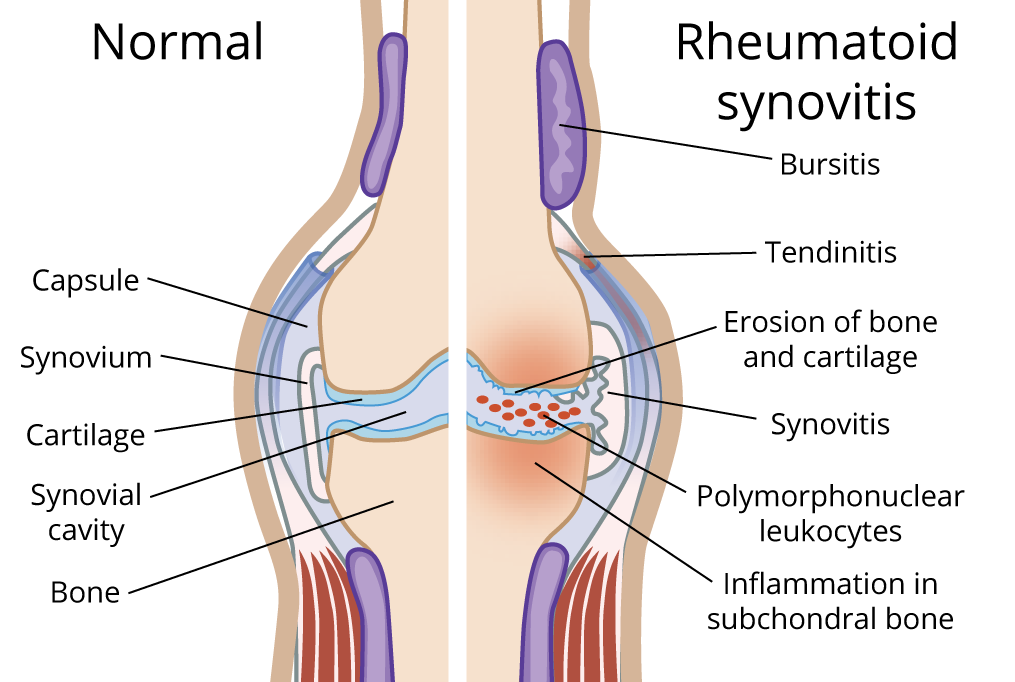
Rheumatoid Arthritis
It is referred to as an auto-immune illness. This means that the immune system becomes disorganized and starts to attack healthy tissues. Rheumatoid arthritis is observed globally, with an estimated prevalence of 1 to 2%. The prevalence increases with age, reaching up to 5% in women over the age of 55.
Overview
Symmetrical joint swelling is a classical persistent symptom of rheumatoid arthritis that presents over time. Meanwhile, when only a few joints are affected at the onset of the disease, symmetry may not be visible. The swelling in RA is often described as doughy or spongy. Inflamed joints can occasionally feel warm to the touch. Inflammation, structural deformity or both may limit the joint's range of motion. The inflammatory process can result in permanent deformity.
Persistent tenosynovitis and synovitis cause synovial cysts and displaced or ruptured tendons. Untreated rheumatoid arthritis causes joint damage over time and can lead to serious disability. Advanced RA changes include ulnar deformity, hyperextension or hyperflexion of the metacarpophalangeal joints, elbow flexion contractures, and carpal bone and toe subluxation. Early detection and treatment can often prevent joint destruction and other complications.
Causes
Age: Rheumatoid arthritis can affect individuals of any age, but it is most common among those between the ages of 40 and 60.
Gender: Women are two to three times more likely to have rheumatoid arthritis than men.
Genetic and environmental factors, Such as smoking and diet.
Weight: If you are overweight, you are much more likely to develop rheumatoid arthritis.
Cigarette smoking increases the risk of developing rheumatoid arthritis significantly.
Diet: Eating a lot of red meat and not getting enough vitamin C may increase your risk of developing rheumatoid arthritis.
Symptoms
Rheumatoid arthritis is characterised by the following symptoms:
Joint pain
Joint swelling
Warmth, redness, as well as stiffness are common, particularly when first arising in the morning or after sitting for an extended period.
Other symptoms include
Drowsiness and a lack of energy
A lack of appetite and weight loss
Fever or a high temperature
Sweating
Dry eyes
Chest pain is a typical side effect of inflammation.
Rheumatoid arthritis can affect any joint in the body, but it is most commonly felt in the hands and feet. Both sides of the body typically experience symptoms simultaneously and in the same way, but this does not always occur. Some individuals develop soft lumps under the skin around affected joints called rheumatoid nodules. They can be painful at times, but are usually not.
Ayurvedic View
Aama vata- due to following of nidanas (causes), like consumption of virudha ahara (incompatible food), adhyashana (having food before digestion of previous food) etc, leads to agni mandhya (low digestion or metabolism) forms aama (disease causing toxin) and along with aggravation of vata dosha and when person consumes guru (heavy), abhisyandi ahara (food that which blocks channel) etc, this aggravated vata dosha carries ama to kapha sthana mainly asthi sandhi (shleshmaka kapha-joint), mamsa (muscle tissue), this sama vata, along with other dosha involvement of pitta and kapha dosha, leads to destruction of tissues and symptoms like sandhi sthabdata (stiffness of joints) and ati ruja (severe pain ), where person describe shoola (pain) as vrushchika damshavat (scorpion sting like ), this is rheumatoid arthritis. The Ayurveda way of approach is to correct agni (metabolism) of jatara agni (metabolism) and dhatva agni (cellular metabolism), bring dosha back to prakruta awastha (balance state- place, quality and normal functioning), rehabilitate the affected area and reduce the symptoms and promote the remission of this disease, correct the deformity caused in this disease by Ayurvedic panchakarma treatment and internal medication.
Rheumatoid Arthritis
Treatment for
DISCLAIMER: Listed treatment details are only for information purposes. Treatments and duration may vary depending on numerous factors. Treatments for your condition may not be limited to this list.






















